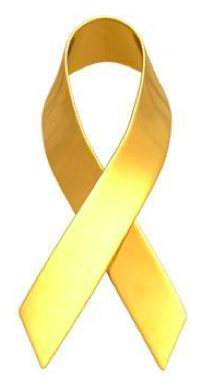Many people associate September with blood cancer awareness month - a global event helping to raise awareness of blood cancer. But since 2012 it has also been childhood cancer awareness month –represented with a gold ribbon. Why gold? Well, since gold is a precious metal, it is therefore the perfect colour to reflect that which is most precious - children.

Unlike other cancer awareness ribbons which represent only one type of cancer, the gold ribbon is a symbol for all forms of cancer affecting children and adolescents. It is estimated that 400,000 children and adolescents of 0-19 years old will develop cancer each year globally and cancer is one of the leading causes of death for children and adolescents. The main types of paediatric cancers are:
- leukaemia
- neuroblastoma
- Wilms tumour
- brain cancer
- rhabdomyosarcoma
- lymphoma
- retinoblastoma
- osteosarcoma and Ewing's sarcoma.
In current practice, childhood cancer treatments are highly successful and more than three quarters of children survive. But there is, crucially, variation between different types of cancer. Cancer treatment is long and unpredictable. It is characterised by the absence from home, school
or preschool, separation from family, friends and pets, changes in physical appearance, daily routine and multiple side effects of the treatment.
It is also a huge emotional rollercoaster – for a child and for the family. It requires the adoption of new habits and behaviours and a huge adjustment for the whole family. After receiving a diagnosis of cancer, first emotions are usually described as fear, denial, sadness, guilt and anger. But as treatment continues, we become an effective ‘cancer-fighting team’, and most families successfully accept this new reality. They rapidly learn about medications, treatments, diagnostic procedures etc.
For me, as a nurse, working with paediatric cancer patients is a privilege and huge responsibility, but it can also be very emotionally demanding due to complex cancer care. When you spend some time with our golden crew - you can see that they are still children, but unfortunately children who have had to grow up a little faster due to this new reality. Cancer has a huge impact on children's emotional health and wellbeing. Studies have shown that often many visible side effects to treatment, such as hair loss and weight gain, can result in low self-esteem. Being apart from friends for prolonged periods of time can lead to poorly developed interpersonal skills and feelings of isolation. Some parents have even reported the child had experienced bullying or teasing from their peers because of their cancer.
One of the most important things to understand is that this gold ribbon is not only for September, it is for the whole year. It means continuous learning, improving our skills, talking about malignant diseases, raising awareness and trying to improve the quality of life of our patients and their families.

Useful resources:
- Children's Cancer and Leukaemia Group: https://www.cclg.org.uk/
- The European Society for Paediatric Oncology: https://siope.eu/
- WHO. Childhood cancer : https://www.who.int/news-room/fact-sheets/detail/cancer-in-
children - Children with cancer UK: https://www.childrenwithcancer.org.uk/